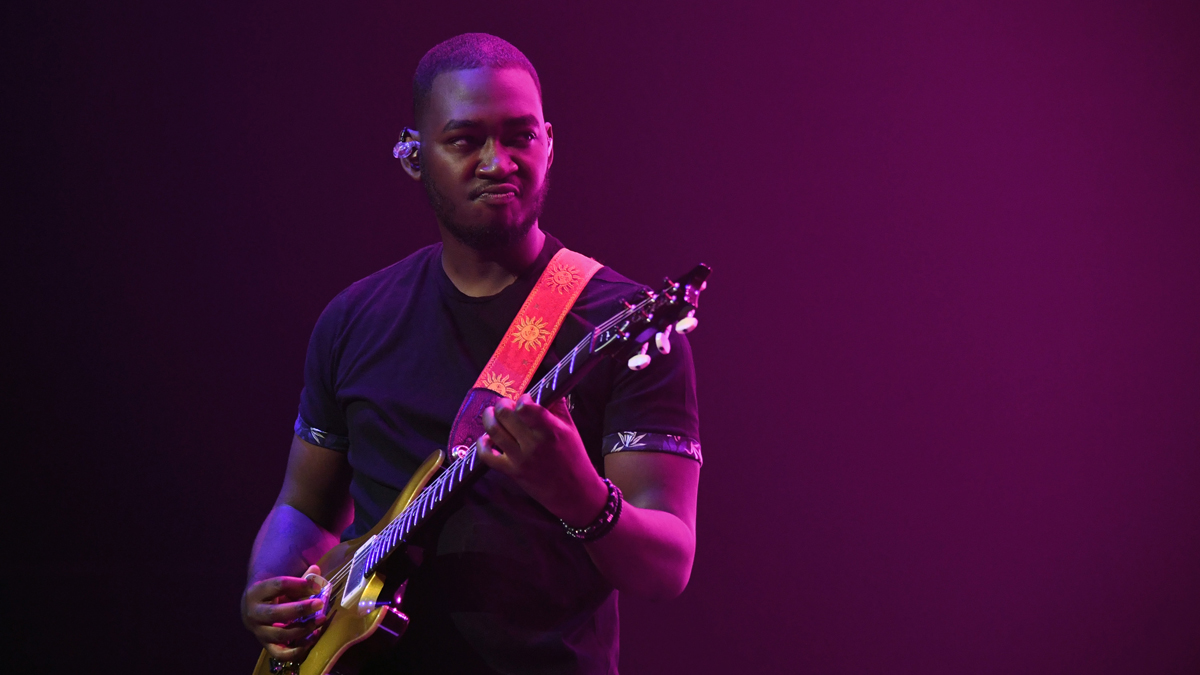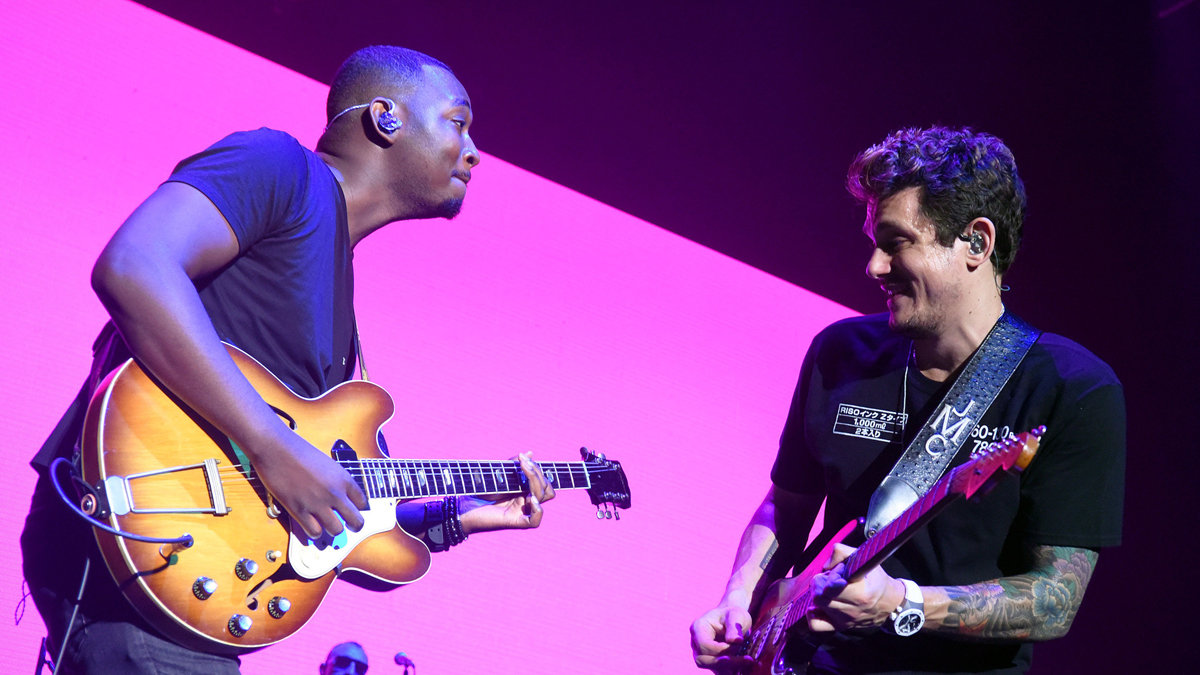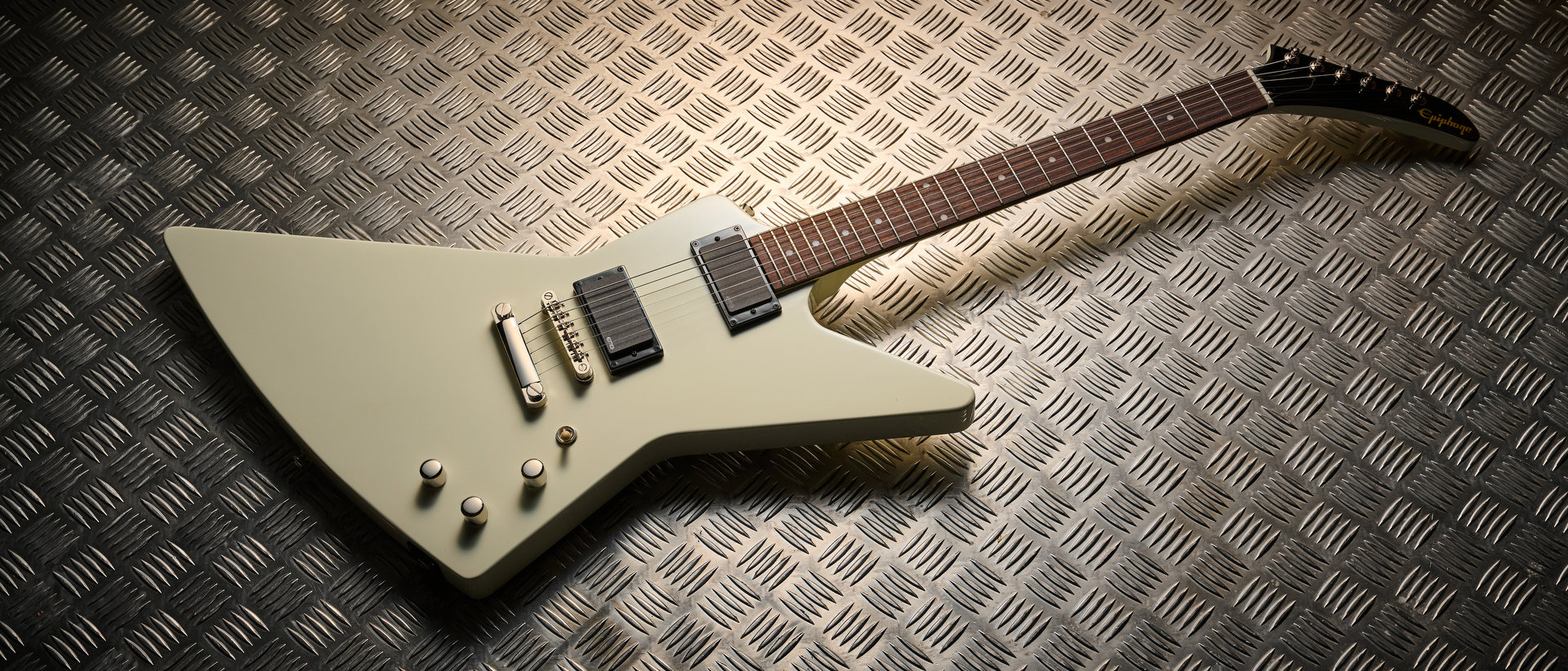Isaiah Sharkey: "I never chased being a celebrity guitarist, because I'm too busy liking what I do"
The in-demand session player, John Mayer sideman and solo artist details his genre-crossing career, go-to recording tricks and the guitars he wants to add to his 40-strong collection

Isaiah Sharkey has built an enviable reputation as a guitarist’s guitarist. His voluminous credits cover all genres, and when he’s not in the studio you’ll find him onstage, whether that means touring the world as a member of John Mayer’s band or jamming in a hometown Chicago club with Snarky Puppy.
The accolades from his colleagues are endless; his fanbase is widespread and dedicated. Still, you won’t find him on national magazine covers or “best of” lists – at least not yet – and he’s fine with that.
“I never chased being a celebrity guitarist, because I'm too busy liking what I do,” he says.
“It’s not about being in the limelight. If it comes, it comes, but I want to be whatever I need to be to contribute to music. That's more important. If someone says, ‘Hey, man, there's this guy around the corner that plays guitar, and I learned from him and he helped me along the way,’ I’m cool with that. If someone is impressed with my playing, that’s great, but my job is to affect people and love what I do.”
Sharkey grew up surrounded by musicians. His father, brothers, and uncles introduced him to gospel, R&B, blues, jazz, funk, and rock, and nurtured his passion. Equally influential was his upbringing in the church, where he sang and played guitar alongside family members. It is a foundation on which he still firmly stands.

“I am very much rooted in the church and the spiritual aspect of life,” he says. “Chicago is a big, strong part of who I am. I learned from my father and my older brothers and uncles, who turned me on to a lot of music. I not only studied it, but also have love and respect for it.
"I play in honor of the people who came before me, whether it be family members that were great musicians or some of my heroes here and abroad. I also play in gratitude to our Creator for the gift to be able to do this.
All the latest guitar news, interviews, lessons, reviews, deals and more, direct to your inbox!
“You practice, practice, practice, and then all of a sudden, you're expressing,” he continues. “For me, everything that happens around us, to us, and for us ties into that expression, and so I come from a place of being thankful and grateful to be able to do that with my instrument.”
He was a preschooler when he received his first guitar. Three years later, an uncle gifted him an electric model and there was no turning back. At 14, he was playing in local jazz and blues clubs, and recorded an album, Skyliner, with his father and brothers.
From there, he became an in-demand sideman, accompanying gospel artists and touring as lead guitarist for Ronald Isley, with whom he recorded two albums. In 2009, while still a teenager, he joined D’Angelo – that’s his guitar work on the Grammy-winning Black Messiah [2014]. Since then, he has been busy packing his resume with a who’s who of artists.
Sharkey is currently at work on his third solo album, Black Sunshine, following Love Is The Key: The Cancerian Theme [2019] and Love.Live.Live. [2017].
“There will be a bit of my perspective, and probably some other people's perspectives, of how we've been dealing with the effects of the pandemic, and the things we see on the news in relation to violence and hate crimes,” he says of the upcoming release. “But in the midst of all of that, there’s still love around us, and we have to acknowledge all things. So I'm talking about all of that stuff.”

You are a singer, songwriter, guitarist, bandleader, sideman, studio musician, and producer. How do the skills differ and inform each other?
"As a side guy, I develop sensitivity within the music, knowing when to play and when not to play, and understanding my role. I am another instrument accompanying whoever's in the front, knowing my parts and helping the music speak. As a musician, that is my job and desire – to come up with parts that are effective within the music, and stay out of the way of whatever is at the forefront.
"Being an artist is a great platform to express all of the different influences that mold and shape your playing and your view of music. Writing is an opportunity to express that.
"As a producer, because I've been fortunate to be in a lot of situations with artists in different genres, it gives me a nice palette to choose from, understanding how to get tones, place vocals, and hone in on developing complete thoughts and molding songs together. I think all of those skills support each other."
Does that also allow for free rein on your own projects? This is probably a weak analogy, but instead of just serving up meat and potatoes on your albums, you're a chef who can add all these different ingredients and create a seven-course meal.
The moment someone can put you in a box, the show is over, because there's no need for your voice if it's predictable
"I’m not too concerned about being put in a box. The moment someone can put you in a box or decide what you feel, the show is over, because there's no need for your voice if it's predictable. No matter how much we get used to listening to someone’s music, we still don't know exactly how they feel.
"We don't know what they could feel tomorrow or in the future. So I think it is very important that we don't put a cap on artists, and we just allow them to be who they are and respect the art.
"That’s how I look at food as well, so that was actually a great analogy. Some of my favorite food is Indian food. If you're familiar with Indian food, there are so many different flavors within one dish that pop out, and I like a lot of flavor to my food. I look at the different influences and genres that might be reflected in my music as flavors.
"If I had to say what I would want to be categorized as, I would just say soul music, because soul music is anything that comes from the soul, whether it be Wes Montgomery, Jimi Hendrix, Albert King, Stevie Wonder, Art Tatum, Charlie Parker, Miles Davis. All these people play from the soul, so that is soul music to me, spiritual music."
Let's talk gear. Here is what we know: Gibson ES-335, Fender Strat and 1964 Jazzmaster, Fodera, D’Angelico, Abasi, Framus, Ibanez, PRS Silver Sky, 1963 Epiphone Casino, Paoletti, Squier, Hybrid, and Taylor acoustics. You’re laughing! How many guitars do you own?
"Oh, man, more than I should!"
That's not true. Every guitarist needs “just one more”.
"Oh yeah, always one more! I have 30-something, maybe 40 guitars."
What have you changed or added recently, and did that help keep you motivated during a year of pandemic lockdowns?
"Yeah, it keeps me excited. It gives me inspiration. Lately, my rig has been quite simple. There are three guitars I've been gravitating towards quite a bit. One is a 1962 Gibson SG Special with two P-90s. I've been loving that thing. Another is a Lockhorn. A good friend of mine, Zach [Duran], has his own company here in Chicago. His guitars are modeled after a Les Paul Special.
"I have a Cort Hiram Bullock signature model, which is really nice. It’s been slightly modified, so it has an HSH configuration and a couple of switches for coil-tapping.
My pedalboard has been really basic lately and it puts more pressure on me to just play. I can't hide behind pedals!
"As for pedals, at home I love the analog thing, that's my ultimate favorite stuff, but in local settings and even some sessions I've been using a Boss ME-80 and a Fender Twin.
"It's been really basic lately and it puts more pressure on me to just play. I can’t hide behind pedals! I’m into the Spanky Alford and Jef Lee Johnson world: you have one pedal, an overdrive, and for everything else you’ve got to make those fingers work. On the road, my 'board is slightly bigger with some nice, cool pieces in there because, hey, we’re guitar players!"
What about amps? You’ve used Vox, Gallien-Krueger, Orange, you mentioned the Twin. What else?
"I used to play Vox quite a bit in 2012 when I was with D’Angelo, and they’re really good. I had two Tony Bruno amps that were based on the AC30s, and then I started using Orange. I still have them, and I use them when they’re appropriate. Lately, on tours I’ve been switching back and forth between Paul Reed Smith DG30s and SW50 Morgan Amps. Those are my stage rigs.
"I’ve been using Fender Twins quite a bit and I’m getting familiar with Victory amps, which are great. I love a big, huge, clean amp, for the most part. If I want to dirty it up, I’ll dirty it with my pedal.
"I have a Fender Tone Master Deluxe, which has cabinet simulation through XLR on the back of the amp. It’s solid-state, way lighter to pick up when you’ve got local gigs or something like that, and it sounds pretty good. If you’re a purist, you might hear some subtle stuff, but I’ve definitely fooled some engineers with that amp. They’ll ask, ‘Is that a ’65?’ ‘No, no, that's a 2021.’"
Let’s talk about the Hybrid.
"I have the Big 6, which looks like a Les Paul Jr., and I have a seven-string 335-type model. Both of those have one pickup, but the pickup is split. On the Big 6, you have three bass strings and three guitar strings.
"The guitar has its own signal and you run it through a guitar amp, and the bass strings have their own signal, so you can run them through a bass amp, which is great because it gives you control. If you want effects on just the guitar, it doesn't have any effect on the bass.
"Typically, when I've done shows with the Hybrid, I've kept my guitar rig the same – a Fender Twin or a Victory, and whatever pedals I'm using for that particular gig. With the bass amp, its either an Aguilar or an Ampeg to have that big, fat sound that I like."
Since every guitarist needs “just one more”, what's on your wish list?
"Oh, man, that’s a loaded question! I definitely would love to have a blonde [Gibson] L-5 with one pickup, or an Ibanez '70s model of the L-5. I would love an early '60s Strat. That would be great. And a 1930s Martin."
What is your definition of tone, and how has it changed over the years?
"My definition of tone is whatever is pleasing to your ear. Sometimes there are tones that you have to use on recordings that, if you listen to it alone without any other instruments or music, you think, ‘I wouldn't necessarily use that,’ but there's something about it in the mix that just works. Tone is basically finding out what’s good to you first, and then making it work in certain situations.
As a session musician, somebody might say they want an Eddie Van Halen type of tone. You want to do enough studying to get close to the tone they require
"And also understanding how to achieve tones. As a session musician or sideman, somebody might say, 'I want to get a Larry Carlton tone,' or a Paul Jackson Jr. tone, or an Eddie Van Halen type of tone. You want to do enough studying to get close to the type of tone they require.
"My personal tone has changed quite a bit, and that’s due to the fact that, as you get exposed to more music over time, with experience and life and everything, it shapes things and you start to settle into what it is that you do."
What does your practice consist of?
"My practice routine is basically working on my personal goals, things that I feel like, ‘I could strengthen this part of my playing,’ or, ‘I could strengthen my understanding of this about music or the instrument.’
"A lot of it is working on a song or solo that I've always wanted to learn, achieving that, and picking it apart and finding little methods or concepts that I can use in my own musical journey. A lot of practicing for me is just getting on the instrument, playing, enjoying it, and seeing what comes out."
Are there certain recording techniques that you swear by?
"I'm always looking for a clean sound before anything when it relates to my guitar. I may use multiple mics in the room to get different types of options for sounds. I might mic the whole room, rather than just the amp itself.
"I typically like to get a clean signal from whatever my pedalboard is, and get a signal from the amp or amps. But again, all this can change, depending on what you are trying to achieve. One technique might not work for everything.
"For vocals, I love a nice, crisp microphone that is clean but has an attack. But there are moments where you might want an old-school type of sound, and you might use a snare mic to do vocals, and moments where you want the grit and the cool lo-fi stuff. There are no rules. I keep myself open."
What is the difference between playing guitar and being a guitarist?
"Playing guitar is the fun part. You’re like a kid – you’ve got your toy, you’re happy, you’re excited, you want to play, and it gives you nothing but joy. As a guitarist you have that same joy, but you also have a responsibility and a job to do, and you want to execute whatever your assignment is in that particular situation.
The 'guitar player' enjoys the house. The 'guitarist' is the carpenter or the construction worker who builds it
"When you say ‘guitarist,’ you want to be as complete as possible. When someone wants you to play jazz, blues, rock, punk, or whatever, you have the tools you need for different situations.
"A guitarist focuses on building the house, not just living in it. The 'guitar player' enjoys the house. The 'guitarist' is the carpenter or the construction worker who builds it. But they both still have to have love for the instrument."

In closing, what is on your heart right now?
"I’ll direct it towards life, because I believe life will affect your music, and that maturity, learning, and constantly reevaluating ourselves as human beings helps us make better decisions, wiser choices, and makes us treat ourselves and others better. I think universal love is super-important. Peace is super-important.
"I think we all need to love one another and appreciate people for their differences, whatever their life choices or decisions. Everybody is born a certain way, and we have to appreciate people for their individuality. If we do that, we’ll get a lot accomplished.
Each artist is expressing themselves. It might not suit your fancy, but it's their art, and we should respect that
"It’s the same with music. Each artist is creating and expressing themselves. It might not suit your fancy, it might not be something you gravitate towards, but it’s their art, and we should respect that.
"As humans, we all should focus on respect and universal love, and getting an understanding of people’s concepts and ideas. That’s what I have on my heart."
Alison Richter is a seasoned journalist who interviews musicians, producers, engineers, and other industry professionals, and covers mental health issues for GuitarWorld.com. Writing credits include a wide range of publications, including GuitarWorld.com, MusicRadar.com, Bass Player, TNAG Connoisseur, Reverb, Music Industry News, Acoustic, Drummer, Guitar.com, Gearphoria, She Shreds, Guitar Girl, and Collectible Guitar.
